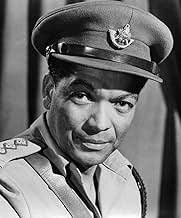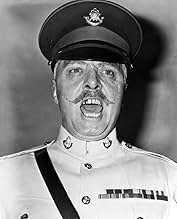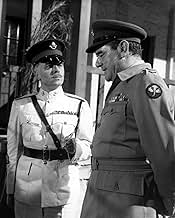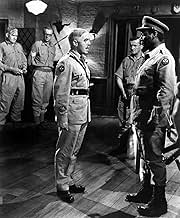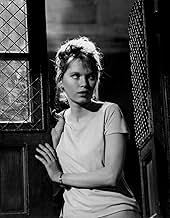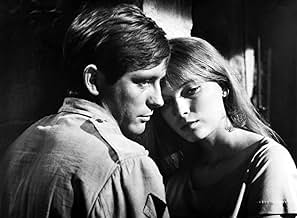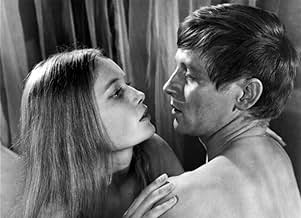Ein anachronistischer strenger Regimentsfeldwebel, der sich in einer abgelegenen kolonialen afrikanischen Armee befindet, die bei einem lokalen Staatsstreich gefangen genommen wurde, muss se... Alles lesenEin anachronistischer strenger Regimentsfeldwebel, der sich in einer abgelegenen kolonialen afrikanischen Armee befindet, die bei einem lokalen Staatsstreich gefangen genommen wurde, muss seine Erfahrung nutzen, um die ihm anvertrauten Personen zu verteidigen.Ein anachronistischer strenger Regimentsfeldwebel, der sich in einer abgelegenen kolonialen afrikanischen Armee befindet, die bei einem lokalen Staatsstreich gefangen genommen wurde, muss seine Erfahrung nutzen, um die ihm anvertrauten Personen zu verteidigen.
- 1 BAFTA Award gewonnen
- 2 Gewinne & 2 Nominierungen insgesamt
Empfohlene Bewertungen
It's a splendid character study of a British Army Regimental Sergeant Major set in an absorbing - and rather accurately prophetic - plot of a post-colonial African revolution.
After Richard Attenborough, properly dominant as the thoroughly professional, no-nonsense Regimental Sergeant Major, the almost uniformly solid casting gives us nice turns by the four sergeants, Leyton as Pte. Wilkes, Flora Robson as the gullible MP keen to believe her ilk's pie-in-the-sky Marxisant p.c. propaganda, Errol John as the African rebel officer, and the always splendid Jack Hawkins as Lt. Col. Deal (an apt name considering the part his character fulfils in the story). Teenaged Mia Farrow has a small role (her first in cinema, I think) as a events-stranded UN secretary who shares a mutual lust interest with Leyton's Pte. Wilkes (Farrow's scenes were re-shoots owing to the originally-cast Britt Ekland's desertion from the filming to fly to her then-paramour Peter Sellers' side while he was working in the U.S.). The writing is very good and, as I said, prescient in view of the continuing undeserved credibility placed in chiefly venal Third World leaders by Western politicians, media, and p.c. types; Guillermin's direction is sure-handed; and production design and cinematography - some very good B&W work here aided by capable lighting - are a cut or two above workmanlike.
Though shot entirely at England's Pinewood Studios on a rather low budget, the strong script and fine acting raise 'Guns At Batasi' to the level of a minor classic well worth appreciating.
It's one of Attenborough's finest performances: Certainly up there with Brighton Rock.
This phenomenon started for the British when they left India to her own devices in 1947. It started with Ghana in 1957 and Guns At Batasi starts as a scene being repeated over and over in Africa, British regular army forces packing up and turning their military installations over to the new African armies of whatever country they were in.
But there's a bad political situation brewing here. The Africans that the British have turned the country over to are now being threatened themselves by a military coup. As RSM Richard Attenborough and his mates are just enjoying some last hours at their Sergeant's Mess, wounded Captain Earl Cameron seeks refuge. His lieutenant Errol John is part of the new government and he wants Cameron as a war prisoner.
There's a bit of racist attitude in Attenborough and his peers, but they have been in Africa for years and know the temper of the people. A great deal more so than Lady MP Flora Robson who knew Errol John as a student in London and feels she can reason with him. She gets disabused of that notion rather fast.
It's a delicate political situation that Attenborough doesn't need reminding of. Still he shows some good initiative in his response.
Guns At Batasi is a snapshot in time of the changing face of Africa. And even more interesting is the fact that the film was shot in the United Kingdom without setting foot in Africa. The producers could get away with it because most of the film takes place in and around the sergeant's mess. And Africa was replete with Batasi like incidents to make location shooting not a good idea.
Although he's backed by a superb cast which also includes Jack Hawkins as the local army commander and Cecil Parker as the former colonial administrator of the area, Guns At Batasi is the film of Richard Attenborough. He really does become the spit and polish, all army RSM. It is said that the high non-commissioned officers really run the army in an country and with people like Attenborough you can believe it.
Errol John is wonderful in his role as well. A few years earlier this was a part earmarked for Sidney Poitier, but now many black players were getting their due. John should have had a great career.
Guns At Batasi is a great film about the declining days of the British colonial empire. This was when the sun was finally setting.
The film stands squarely on Richard Attenborough's pitch-perfect performance as a Regimental Sergeant Major - the performance of a lifetime, especially when you consider that Attenborough is the complete opposite of the character he plays in this film - in reality he's soft-spoken and unassuming, yet the character he's playing is not at all those things. To say that this role was a stretch somehow doesn't do the performance justice - Attenborough literally becomes the RSM, and every moment he's on screen is incredible. Some reviewers assume that his performance is over-the-top, but I can assure everyone that British NCOs do act like this - or at least they did in the 1960s - I had the honour of knowing one of them.
Not that Attenborough is doing it all alone - the other performances are perfect too, as is the direction. The fact that the film was made in a studio in England makes you realise what a great job a truly great crew can do for a film - there's no way you'd think this movie wasn't made in Africa.
Altogether a fantastic movie - probably the best new film (new to me anyway) I've seen in the last two years. This blows everything else out of the water.
Oh, and for those worried that it's a war film - definitely not. It's a drama set in a military barracks, but psychological drama is what we have here, and unlike a lot of those kinds of films this one has a heart and a sense of humour. Don't miss this one!
Handlung
WUSSTEST DU SCHON:
- WissenswertesBritt Ekland had been cast as Karen Eriksson but pulled out three weeks into production. She had just married Peter Sellers who apparently was so jealous of her casting alongside John Leyton that he asked his actor friends David Lodge and Graham Stark who were also in the cast, to secretly spy on her. After being frequently quizzed on the telephone by Sellers about the shooting and who she acted with, Ekland left the Pinewood Studios in Buckinghamshire, and joined Sellers in Los Angeles. 20th Century-Fox sued Ekland for $1.5 million; Sellers counter-sued for $4 million claiming the Fox suit caused him "mental distress and injury to his health".
- PatzerThe personal weapon used by the British is the Sterling sub machine gun which replaced the Sten in the British Army in 1953. This weapon is held with the left hand on the barrel and never the magazine or housing. Holding the magazine is a throwback to its predecessor, the Sten. The experienced senior members of the Mess are holding it incorrectly whilst the most inexperienced among them (Private Wilkes) holds it correctly and naturally.
- Zitate
RSM Lauderdale: Will you stick a boomerang in that great Aussie cakehole of yours until I've finished?
- VerbindungenFeatured in Film Review: Richard Attenborough (1968)
Top-Auswahl
- How long is Guns at Batasi?Powered by Alexa
Details
- Erscheinungsdatum
- Herkunftsland
- Sprache
- Auch bekannt als
- Guns at Batasi
- Drehorte
- Produktionsfirmen
- Weitere beteiligte Unternehmen bei IMDbPro anzeigen
- Laufzeit1 Stunde 43 Minuten
- Farbe
- Seitenverhältnis
- 2.39 : 1
Zu dieser Seite beitragen



